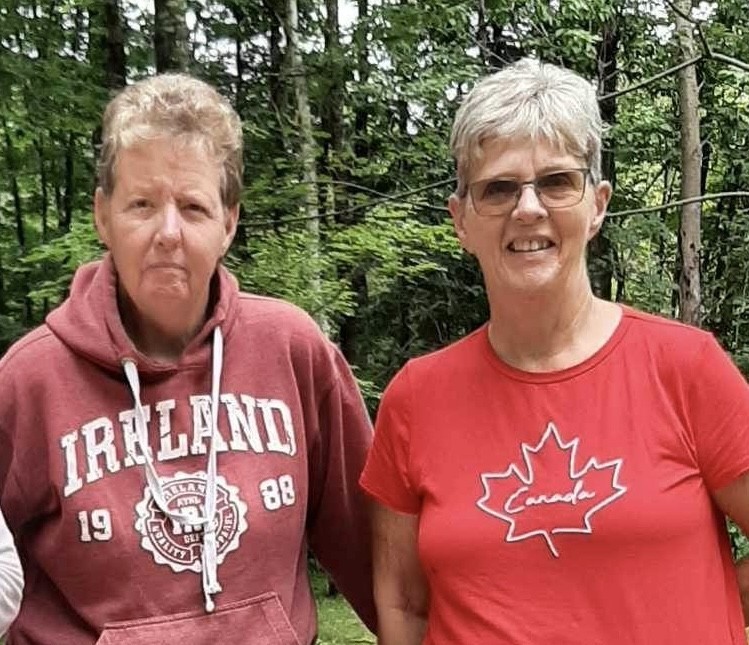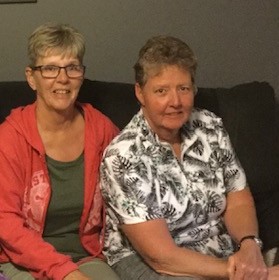
A survivor and a supporter: Introducing our Ontario 50-50 raffle winner
Our Ontario 50-50 raffle was a huge success, with a jackpot that reached an incredible $18,491! Thank you to everyone who purchased tickets, helping to fund life-changing research, support programs and advocacy.
We’d also like to thank our gracious winner, Sue Siscoe of Fort Erie, Ont., who so generously donated $2,245 of her $9,245 winnings back to Brain Tumour Foundation of Canada.
As to what inspired her to do so, Sue and her sister, Betty Wiswell, hold the organization near to their hearts. Both brain tumour survivors, Sue (pictured below on the left), and Betty (pictured below on the right), know firsthand what it’s like to be impacted by a brain tumour.
A family’s journey
 Betty was diagnosed with meningioma in 2010, while serving in the Canadian military.
Betty was diagnosed with meningioma in 2010, while serving in the Canadian military.
When Sue, now 74, began experiencing symptoms four years later, her doctor brushed it off.
“I told him my sister was diagnosed with a brain tumour and he said, ‘Oh no, it’s not a familial thing,’” Sue recalls.
Sue, a nurse, pushed back and insisted that her doctor take her seriously.
“He said, ‘Okay, I’ll send you for a CT scan, but it’s not going to show anything,’” Sue says. “He called me back a week later and said, ‘You’re not going to believe this…’”
Sue was diagnosed with a meningioma—the same type of tumour as her sister, though hers was in a different location.
Betty’s tumour, behind her right ear, has caused numerous, long-term issues for her.
“She’s my hero, really and truly,” Sue says.
Sue’s tumour was found at the bottom of her skull. She went to the same neurosurgeon as Betty, and was given the option to “watch and wait.”
“It was low-grade at that point,” Sue says, “but because of my age, and the fact that I was pretty healthy, the neurosurgeon said surgery sooner than later would be a good idea.”
Sue had surgery six months after her diagnosis, saying she’s “never looked back.”
“I was very lucky,” Sue says. “I was able to carry on with my life. I have an MRI every two years now.”
Showing support
She and her sister have been long-time supporters of Brain Tumour Foundation of Canada, with Betty participating in Hats for Hope and the Brain Tumour Walks, and Sue donating to Betty’s efforts.
“She does the walking and I just pay money,” Sue says, laughing. “I’m 10 years older than she is. But we do the best we can.”
With Sue having a little extra to spend on top of her latest donation, she’s planning to take a trip.
“I’m thinking Portugal or Spain,” she says. “I did Greece last year, so this will be a bonus vacation.”
All tumours are significant
As grateful as Sue is that she’s able to do things like travel, she wants to share that others with non-malignant, or benign, tumours aren’t always as fortunate.
“My sister and I both had ‘benign’ tumours, which to some, means they’re not significant,” Sue says. “But, they are significant, depending on where they happen to be. They aren’t going to metastasize, but they’re called space-occupying lesions for a reason and unfortunately, your skull doesn’t have that much space in it. ‘Benign’ doesn’t mean insignificant, and that’s what I think people maybe don’t understand.”